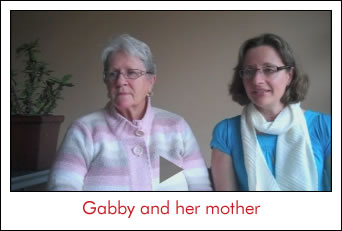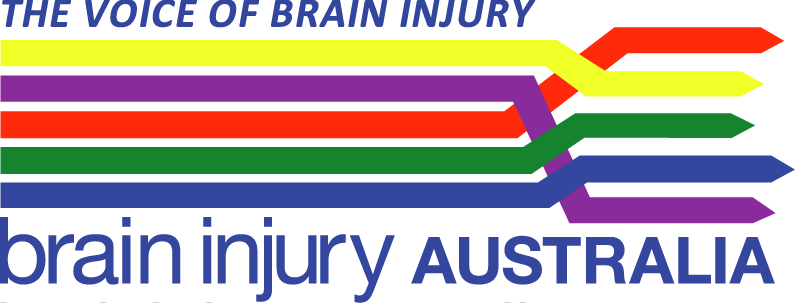- MODULE 2: Working with ABI
- Introduction
- Take the Pre-test
- A. Uniquely building independence
- a) Unique
- b) Injury-Effect-Behaviour
- c) Frontal lobe proxy
- d) Change happens
in the day to day - e) A life span view
- f) Person centred, Goal directed
- B. Through emotions and relationships
- g) Person with ABI
- h) Family members
- i) Grief and loss
- j) Support workers
- k) Managers and Team leaders
- l) Case managers
- m) Professional boundaries
- C. With services
- n) Pathways
- o) Part of a team
- p) The services network
- D. Principles and standards
- q) Principles and standards
- E. Integration
- r) Practice tools
- s) Case study
- t) Further learning
- Take the Post-test
g) The person with the ABI 
i) The person with the ABI
A person with an acquired brain injury has had a life before the injury. Unless they are very young when they had the injury they will remember the life they had.
The acquired brain injury may have affected their:
- thinking skills - cognitive
- communication/language
- physical/sensory
- emotional/behavioural/personality.
In addition to experiencing these changes the person with the ABI has to respond to and come to terms with their new life situation.
They also have to deal with their family members and friends coming to terms with the changes in them.
As with any major life change loss, grief and rediscovery are part of the process.
However it is not a neat linear emotional process that everyone works though in a given time.
Rules of thumb
- Understand the injury, its effects and effects on behaviour
- Understand the individuals and family responses in dealing with this change
- Understand the individual person and their life / goals prior to the ABI.
A case manager said
It is difficult to acquire appropriate services for people with acquired brain injury. I think that in some instances that may be because there is a lack of understanding about the nature of acquired brain injury and it is also because there is limited funding for services. I guess there is a bit of a perception that people are difficult and it just demonstrates a lack of understanding about the unique nature of acquired brain injury.
The message I would give to those people is to have a bit of understanding. We are all unique beings and we all have unique needs and I guess patience, patience and understanding is the key. Take a bit of time out to try and learn about what it means to be someone that has been affected this way. I think the big issues is that there is a bit of generalisation about people with acquired brain injury. People with acquired brain injury are quite often people who have had very rich, full lives, full of experiences that I could never even perceive. And then something has happened and changed that life in just a second and it is a very difficult process to move on from that and to have to start all over again in some circumstances.
ii) David's Story (11.5 mins)
When David was 20, he had a near fatal car accident on the way to work. It left him with a serious brain injury. He was in a coma for about 3 weeks. He then had months of difficult rehabilitation in hospital. He learned how to sit up, slowly he leaned how to walk again. His speech was very bad, was very difficult to understand him. He improved. He did all kinds of therapy at the Rehab Centre and eventually he went home. He has continued rehabilitation at home for a further 3 years. He lives with his parents and siblings. David’s rehabilitation goals were to be able to return to work and to return to driving. He successfully achieved both of them.
- David
- Diane, David’s mother
- Sonia, David’s Community Support worker
Answer the following questions
DAVID: The day I came home was in June
And it was a wonderful experience.
It’s home. What I like about getting home was the fact that it actually was home.
There is nothing better than coming home.
Our family, friends, my room. It was my room again, my bedroom upstairs. It was my room again.
Now David has support workers to help him only two days a week. But at first they came 6 days a week, with a different worker each day.
DIANE: Having the carers freed me up a lot to attend to the other children’s needs. Because I still had 3 daughters that still needed, you know, a mum. And I couldn’t be 100% for David, because they needed me as well. So, that was wonderful, because the girls got to see that I got freed up and I would structure it that way, so that I could say to the girls ‘Ok, let’s go do this today’ or ‘Let’s go do that today’. So, it was good, but it was challenging having somebody else in your house all the time. It was challenging.
Did people find that a bit of an invasion of their space?
DIANE: Yes. Yes, I would say that they still feel that that’s an invasion of their space. But I think they’ve learned to manage that. And they can see how much David has progressed because of all of the different support he’s had in so many different ways.
ON SCREEN: One of the things David is working on now is increasing focus on activities.
DAVID: I’m trying to achieve in the focus tasks me keeping my concentration on something for a period of 45 minutes to an hour. And without changing my focus to something that’s not as productive. For example, getting distracted by what’s going on outside the window. It happens quite a lot though.
SONIA: Because like 18 months ago David wouldn’t have focused for 5 minutes on a focus task and it was always like I . . . to be here…
DAVID: My brain always…
SONIA: …and its always our job to try to refocus, stop getting distracted. What are we focused on? That’s the activity he’s meant to be doing. And that could have only lasted 5 minutes 18 months ago.
And now?
SONIA: But now…
DAVID: And gradually we improved.
SONIA: Now easily we can do 45 minutes.
DAVID: We gradually increased the focus task time from 5 minutes to 8 minutes to 10 minutes to 15 minutes, 20, 25, half an hour, 45. And that’s where we are now.
iii) Emma's Story (11 mins)
In March 2011 Emma & her newborn baby had a serious accident. The first time out walking with Eloise in a pram they were hit by a car. Emma was flown straight up in the air, landed on head. She had a fractured skull. Emma was airlifted to Royal Prince Alfred Hospital; the baby was taken to the Children’s Hospital at Randwick. Emma was in intensive care and then 2 or 3 months in a brain injury ward. She has very serious injuries. When she left hospital she went to live at her father’s and step mother’s house. She needs 24 hour care seven days a week.
- Emma
- Keith, Emma’s father
- Loraine, Emma’s step mother
- Cherie, Emma’s community support worker
Answer the following questions
CHERIE: Today we have when I came on a shift… small sips, OK?.. We completed all Emma’s personal care needs including all showering, dressing, grooming, that kind of thing. Emma is really quite good, very actively involved in a lot of it. My role is simply to assist the areas that Emma struggles with. We went to… I also transport Emma to and from appointments and things like that. So, today we went to the gym. Emma worked really hard there and I think that’s why she’s a bit tired now.
But other than that like eating and drinking, a lot of it is just supervising Emma to make sure that she is safe.
That’s it. And just trying to ensure that Emma safely does things like standing up from a chair, sitting down on a chair. Using certain prompts that help Emma remember how to do those things correctly.
Raising Issues
KEITH: You mustn’t be frightened to say ‘We don’t think this carer is doing a good enough job’.
Say that to the provider so that they change things, you know what I mean?
LORAINE: We do often ask Emma. We say ‘Look Emma, you know, if you are not happy with this carer, it’s you that has to have that carer constantly’.
I mean, it’s 24 hours a day someone looking at you, telling you what to do.
So, it’s up to Emma really. You know, she might not like a carer but she’s never told us that. But we give her the choice.
iv) Questions
Answer the following question:
You have a new information and referral worker interacting with people with acquired brain injury and their family members. You are explaining some of the emotional experiences and issues a person with an ABI may have.
What are some of the points you make?
1. A person with an acquired brain injury has had a life before the injury. Unless they are very young when they had the injury they will remember the life they had. They will have experienced loss and grief.
2. The acquired brain injury may have effected their:
- thinking skills - cognitive
- communication/language
- physical/sensory
- emotional/behavioural/personality.
3. These can impact on their emotions - e.g. they may have a period of depression, they may have some personality change.
4. These emotional changes caused by the brain injury are not mental illness.
5. In addition to experiencing these changes the person with the ABI has to respond to and come to terms with their new life situation.
6. They also have to deal with their family members and friends coming to terms with the changes in them.


